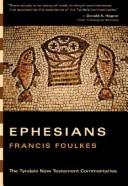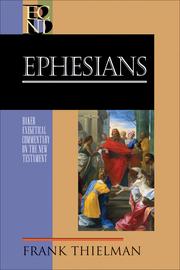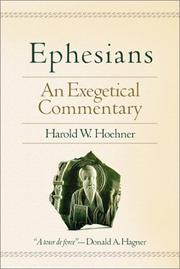| Listing 1 - 10 of 62 | << page >> |
Sort by
|
Book
ISBN: 1577997735 9781577997733 Year: 2017 Publisher: Lexham Press
Abstract | Keywords | Export | Availability | Bookmark
 Loading...
Loading...Choose an application
- Reference Manager
- EndNote
- RefWorks (Direct export to RefWorks)
Book
ISBN: 9780814681749 0814681743 9780814681992 Year: 2017 Publisher: Collegeville, Minnesota Liturgical Press
Abstract | Keywords | Export | Availability | Bookmark
 Loading...
Loading...Choose an application
- Reference Manager
- EndNote
- RefWorks (Direct export to RefWorks)
Ephesians is a "mystery" text that seeks to make known the multifarious Wisdom of G*d. At its heart is the question of power. In this commentary, Elisabeth Schüssler Fiorenza examines the political understandings of ekklesia and household in Ephesians as well as the roles that such understandings have played in the formation of early Christian communities and that still shape such communities today. By paying close attention to the function of androcentric biblical language within Ephesians, Schüssler Fiorenza engages in a critical feminist emancipatory approach to biblical interpretation that calls for conscientization and change, that is, for the sake of wo/men's salvation or wellbeing.
Book
ISBN: 0585402892 9780585402895 9780836197969 0836197968 Year: 2002 Publisher: Waterloo, Ont. Scottdale, Penn. Herald Press
Abstract | Keywords | Export | Availability | Bookmark
 Loading...
Loading...Choose an application
- Reference Manager
- EndNote
- RefWorks (Direct export to RefWorks)
Book
ISBN: 1108643051 Year: 2022 Publisher: Cambridge : Cambridge University Press,
Abstract | Keywords | Export | Availability | Bookmark
 Loading...
Loading...Choose an application
- Reference Manager
- EndNote
- RefWorks (Direct export to RefWorks)
In this commentary, David deSilva approaches Ephesians as Paul's contribution to the ongoing work of forming his converts' individual and collective identity in Christ through the celebration of God's activity (past, ongoing, and future) on behalf of all who had responded in trust and faithfulness toward Jesus throughout the eastern Roman empire. He explores how Paul's first-century audiences in Roman Asia would have understood and responded to his message, particularly his promotion of the attitudes, pursuits, and practices that would constitute an appropriate response of gratitude for so costly a deliverance and so magnificent a destiny. deSilva's discussion is richly grounded in the Jewish and Greco-Roman contexts that both informed Paul as he composed and his audiences as they engaged his message. He is also attentive to points of relevance to the modern contexts of today's readers who continue to wrestle with Paul's vision for Christian discipleship and human community.

ISBN: 0851118798 9780851118796 Year: 1989 Volume: 10 Publisher: Leicester Inter-Varsity press
Abstract | Keywords | Export | Availability | Bookmark
 Loading...
Loading...Choose an application
- Reference Manager
- EndNote
- RefWorks (Direct export to RefWorks)

ISBN: 9780801026836 0801026830 Year: 2010 Publisher: Grand Rapids Baker Academic
Abstract | Keywords | Export | Availability | Bookmark
 Loading...
Loading...Choose an application
- Reference Manager
- EndNote
- RefWorks (Direct export to RefWorks)
Noted New Testament scholar Frank Thielman offers a substantive yet accessible commentary on Ephesians in this latest addition to the award-winning BECNT series. With extensive research and thoughtful chapter-by-chapter exegesis, this beautifully written commentary leads readers through all aspects of the book of Ephesians -- sociological, historical, and theological -- to help them better understand its meaning and relevance. As with all BECNT volumes, Ephesians features the author's detailed interaction with the Greek text. This commentary admirably achieves the dual aims of the series -- academic sophistication with pastoral sensitivity and accessibility -- making it a useful tool for professors, students, and pastors. The acclaimed user-friendly design includes shaded chapter introductions summarizing the key themes of each thought unit. - Publisher.

ISBN: 0801026148 9780801026140 Year: 2002 Publisher: Grand Rapids: Baker Academic
Abstract | Keywords | Export | Availability | Bookmark
 Loading...
Loading...Choose an application
- Reference Manager
- EndNote
- RefWorks (Direct export to RefWorks)
Book
ISBN: 157506636X 9781575066363 9781575068145 1575068141 Year: 2011 Publisher: Winona Lake, Ind. Eisenbrauns
Abstract | Keywords | Export | Availability | Bookmark
 Loading...
Loading...Choose an application
- Reference Manager
- EndNote
- RefWorks (Direct export to RefWorks)
Book
ISBN: 020313091X 1280335742 1134867417 0203303903 9780203303900 1134867409 Year: 1994 Publisher: London ; New York : Routledge,
Abstract | Keywords | Export | Availability | Bookmark
 Loading...
Loading...Choose an application
- Reference Manager
- EndNote
- RefWorks (Direct export to RefWorks)
This study approaches the Epistle to the Ephesians in a radically different way from traditional commentaries. Rather than analysing each individual verse, Martin Kitchen examines the complete text within the framework of contemporary biblical criticism. He acknowledges the debt which biblical studies owes to historical method, while at the same time recognizing the need to view the Epistle against the background of recent literary approaches to New Testament texts. Ephesians also takes into account the important questions of whether the Epistle was written by St Paul and, if not, why
Bible.-- N.T.-- Ephesians-- Commentaries. --- Christian life. --- Bible. --- Christian life --- Christians --- Discipleship --- Religious life --- Theology, Practical --- Christianity --- Ebesosŏ (Book of the New Testament) --- Epheserbrief (Book of the New Testament) --- Ephesians (Book of the New Testament)
Book
ISBN: 9781108493710 1108493718 9781108725446 1108725449 9781108643054 1108643051 Year: 2022 Publisher: Cambridge Cambridge University Press
Abstract | Keywords | Export | Availability | Bookmark
 Loading...
Loading...Choose an application
- Reference Manager
- EndNote
- RefWorks (Direct export to RefWorks)
"In this commentary, David deSilva approaches Ephesians as Paul's contribution to the ongoing work of forming his converts' individual and collective identity in Christ through the celebration of God's activity (past, ongoing, and future) on behalf of all who had responded in trust and faithfulness toward Jesus throughout the eastern Roman empire. He explores how Paul's first-century audiences in Roman Asia would have understood and responded to his message, particularly his promotion of the attitudes, pursuits, and practices that would constitute an appropriate response of gratitude for so costly a deliverance and so magnificent a destiny. deSilva's discussion is richly grounded in the Jewish and Greco-Roman contexts that both informed Paul as he composed and his audiences as they engaged his message. He is also attentive to points of relevance to the modern contexts of today's readers who continue to wrestle with Paul's vision for Christian discipleship and human community"--
| Listing 1 - 10 of 62 | << page >> |
Sort by
|

 Search
Search Feedback
Feedback About UniCat
About UniCat  Help
Help News
News